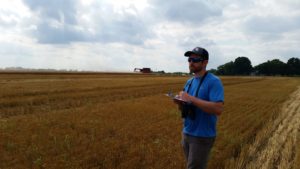Aaron Turner
Hometown: Silver City, NM
Position: Assistant Professor, Ag. Mech. and Business

I’m an assistant professor in the Agricultural Sciences Department at Clemson, and I teach in the Ag. Mech. and Business program. My interest in agriculture started when I was an undergraduate student at NMSU. I was working part-time in the college’s machine shop, and there was a lot of specialty crop mechanization research going on at the time. Through that, I got connected to the American Society of Agricultural and Biological Engineers (ASABE), and I was hooked! From there, I went on to get an M.S. and Ph.D. in Biosystems and Agricultural Engineering from the University of Kentucky. My current research program includes engineering aspects of harvesting and post-harvest processing systems (handling, drying, and storage). This includes the physical properties of bulk materials and how agricultural data can be leveraged to improve the efficiency and sustainability of production.
How important is it for farmers and other people in agriculture to be safe?
Safety should be the number one priority. It’s tempting to take shortcuts sometimes, but everyone deserves to go home safe at the end of the day.
How often do you run across the topic of agricultural safety in your position?
I don’t come across safety very frequently. However, I do cover safety related to working around stored grain facilities in one of my courses. Like many other agricultural jobs, working around these facilities involves being around equipment (tractors, augers, conveyors, etc.). However, there are additional hazards associated with working at heights and confined space entry/grain engulfment. Unfortunately, there are several fatalities at grain facilities each year.
What do you think the biggest concern is regarding agricultural safety?
My biggest concern regarding agricultural safety is the long-term impact it can have on our aging producer population. Thirty-six percent of producers in SC were over 65 in 2017, and normal things associated with aging (hearing/vision loss, slower reaction times, arthritis) make this group several times more likely to have a farm-related injury. This group also has a longer recovery time, so interventions that can help keep this group working safely are good.
Describe the impacts that a safety intervention can have on children.
I think this is one of the areas that could have the most significant impact, even if it is somewhat intangible. Setting an example for what working safely looks like and instilling good habits early would have life-long benefits. This extends beyond interventions with children to the adults who are setting the example.
How do you handle a safety concern among your employees?
In a university research setting, you rely heavily on student help, and the tasks are often unique to a given project. This makes it essential to talk through the work, so everyone is comfortable. It’s important to make sure everyone involved is familiar with the dangers associated with whatever equipment they will be using and stress the importance of asking for help if something feels off. I also provide adequate PPE and ensure no one works alone if there are any potential safety issues.
